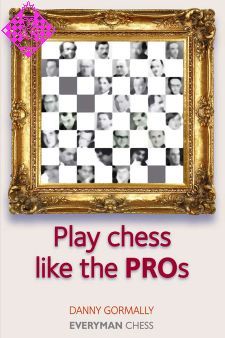Artikelnummer
LXGORPCLTP
Autor
Play Chess like the Pros
208 Seiten, kartoniert, Everyman, 1. Auflage 2010
What separates the greatest chess players from mere mortals? Grandmaster Danny Gormally believes that understanding, preparation and will to win are three crucial factors. He also believes that a player's capacity to improve is limitless, and in this age of computer-assisted learning the opportunity to do so is greater than ever before. But are you prepared to really stretch yourself, to take yourself out of the comfort zone?
Play Chess Like the Pros attempts to bridge the gap between the best and the rest. Gormally studies the styles and strengths of some of today's leading Grandmasters, the characteristics which help to make them succesful, and how we can learn from them to improve our own chess. Nearly 15 years of experience as a chess professional leaves the author ideally placed to tell the stories, not just behind the moves but also the characters who play them, offering the reader an insider's candid view of professional chess in the modern age.
IntroductionThe inspiration for this project came from a conversation I had when playing in Hastings, many moons ago. Walking down the hill back from the tournament hall with a couple of my fellow aspiring mega-talents, we were joined by a young Dutch player. I started going on about how tough it was being a chess pro, to which he abruptly interjected: "you are pretty weak for a professional aren't you?" A cheap jibe I felt. Despite having my ego completely flattened, in these days of hyper-inflated ratings, where even 2700 will struggle to get you a regular income, I have to say deep down I agreed with him, even if his throwaway comment stung quite a little.
These thoughts in turn provoked the question: just what is it that separates the very best players in the world from a struggling pro like myself? Is it just a higher level of ability, or do other factors come into play? If I could quantify the three most important factors that separate the best players from the rest, I would probably come up with the following:
1. Will to win
I've never met a grandmaster that was easy to beat. It's easy to underestimate their competitive instincts, that desperate desire to escape the bitter stab of failAnd the higher up the ladder you go, the more you perceive this. Grandmasare chess street fighters. They simply refuse to lie down and die! It also comes down to inner belief: the top players in the world completely believe in the superiof their thinking over that of others.
2. Preparation
Preparation is so important in chess. A broad knowledge of both chess culture and many different openings is crucial. Quite simply the more knowledge you accrue, the better your chances will be.
3. Understanding
It's funny, but every time I've gone up a level and taken on world-class players, it's like they are speaking a different language. They know where the pieces belong, they know which plans work in different types of positions, and seem to have a far higher level of general understanding. They also have a far greater knowledge of chess culture and history.
In this book I want to look more closely at these aspects, and others, and try to find a way to bridge the gap in understanding and knowledge that separates the very best in the world from the rest. I believe that a chess player's ability to imis unlimited, and in today's high technology world, with super computers and so on, the opportunity to do so is greater than at any point in chess history.
But you really have to want to stretch yourself, to push yourself out of your comfort zone. So you can analyse five moves ahead? Why not make it 10? Calcu10 moves further? Why not 15? Basically most of us are stuck in a rut. We do the same things and fail to challenge ourselves on a regular basis; the key is findto what extent that is the case.
But this is more than just an attempt at a self-improvement book; I've also tried to tell the story behind the moves, to introduce the characters, and to show the reader what it's really like to be a chess player in these strange times.
Danny Gormally Durham, UK
Play Chess Like the Pros attempts to bridge the gap between the best and the rest. Gormally studies the styles and strengths of some of today's leading Grandmasters, the characteristics which help to make them succesful, and how we can learn from them to improve our own chess. Nearly 15 years of experience as a chess professional leaves the author ideally placed to tell the stories, not just behind the moves but also the characters who play them, offering the reader an insider's candid view of professional chess in the modern age.
·
A Grandmaster's revealing view of the modern game
·
Contains advice on many key aspects of chess
·
Covers the increasingly important role of computers
Danny Gormally is an experienced Grandmaster with many tournament successes. He has played for England and is a former British Rapidplay Champion.IntroductionThe inspiration for this project came from a conversation I had when playing in Hastings, many moons ago. Walking down the hill back from the tournament hall with a couple of my fellow aspiring mega-talents, we were joined by a young Dutch player. I started going on about how tough it was being a chess pro, to which he abruptly interjected: "you are pretty weak for a professional aren't you?" A cheap jibe I felt. Despite having my ego completely flattened, in these days of hyper-inflated ratings, where even 2700 will struggle to get you a regular income, I have to say deep down I agreed with him, even if his throwaway comment stung quite a little.
These thoughts in turn provoked the question: just what is it that separates the very best players in the world from a struggling pro like myself? Is it just a higher level of ability, or do other factors come into play? If I could quantify the three most important factors that separate the best players from the rest, I would probably come up with the following:
1. Will to win
I've never met a grandmaster that was easy to beat. It's easy to underestimate their competitive instincts, that desperate desire to escape the bitter stab of failAnd the higher up the ladder you go, the more you perceive this. Grandmasare chess street fighters. They simply refuse to lie down and die! It also comes down to inner belief: the top players in the world completely believe in the superiof their thinking over that of others.
2. Preparation
Preparation is so important in chess. A broad knowledge of both chess culture and many different openings is crucial. Quite simply the more knowledge you accrue, the better your chances will be.
3. Understanding
It's funny, but every time I've gone up a level and taken on world-class players, it's like they are speaking a different language. They know where the pieces belong, they know which plans work in different types of positions, and seem to have a far higher level of general understanding. They also have a far greater knowledge of chess culture and history.
In this book I want to look more closely at these aspects, and others, and try to find a way to bridge the gap in understanding and knowledge that separates the very best in the world from the rest. I believe that a chess player's ability to imis unlimited, and in today's high technology world, with super computers and so on, the opportunity to do so is greater than at any point in chess history.
But you really have to want to stretch yourself, to push yourself out of your comfort zone. So you can analyse five moves ahead? Why not make it 10? Calcu10 moves further? Why not 15? Basically most of us are stuck in a rut. We do the same things and fail to challenge ourselves on a regular basis; the key is findto what extent that is the case.
But this is more than just an attempt at a self-improvement book; I've also tried to tell the story behind the moves, to introduce the characters, and to show the reader what it's really like to be a chess player in these strange times.
Danny Gormally Durham, UK
| EAN | 9781857446272 |
|---|---|
| Gewicht | 340 g |
| Hersteller | Everyman |
| Breite | 15,2 cm |
| Höhe | 22,8 cm |
| Medium | Buch |
| Erscheinungsjahr | 2010 |
| Autor | Danny Gormally |
| Sprache | Englisch |
| Auflage | 1 |
| ISBN-13 | 9781857446272 |
| Seiten | 208 |
| Einband | kartoniert |
| Name | Everyman (former Cadogan) |
|---|---|
| Adresse | 10 Northburgh Street London EC1V 0AT Großbritannien |
| dcaddelman@yahoo.com |
Verantwortlicher Importeuer:
| Name | Schachversand Niggemann |
|---|---|
| Adresse | Schadowstraße 5 48163 Münster Deutschland |
| info@schachversand.de | |
| Internet | www.schachversand.de |
005 Introduction
007 South London's Finest
032 Morphy vs. Carlsen
062 Taking on Transwarp
098 The Gamblers and the Grinders
149 Solving Problems in the Opening
170 Practical Play
192 Combinations
197 Solutions to Exercises
206 Index of Openings
207 Index of Players
007 South London's Finest
032 Morphy vs. Carlsen
062 Taking on Transwarp
098 The Gamblers and the Grinders
149 Solving Problems in the Opening
170 Practical Play
192 Combinations
197 Solutions to Exercises
206 Index of Openings
207 Index of Players
"Play chess like the PROs", Schach spielen wie die Profis, ein anspruchsvoller Buchtitel. Danny Gormally, Großmeister von den Britischen Inseln, ist der Autor dieses bei Everyman Chess erschienenen Werkes.
Wer dahinter quasi einen Leitfaden in der Art "Wie wird man so gut wie ein Profi in fünf einfachen Schritten?" sucht, wird nach dem Kauf enttäuscht sein. Wer aber ein Werk mit nett und auch anspruchsvoll kommentierten Partien mag, während und zwischen denen vorwiegend unterhaltsame Plaudereien die schachliche Kost auflockern, dem wird das Werk gefallen.
Gormally schildert eigene Erlebnisse rund um das Schachbrett und den Turniersaal und auch solche, die anderen in seiner Gegenwart widerfahren sind bzw. von denen diese berichtet haben und die irgendwie auch Einfluss auf das jeweilige Spiel am Brett und den Erfolg gehabt haben. Mit ihnen reflektiert er das, was zu den Grundbedingungen zum Erfolg im Schach gehört: Siegeswillen, Vorbereitung auf die Partie und Schachverständnis. Das Erzählen von guten und schlechten Beispielen gibt ihm die Möglichkeit, sich allgemein mit der einen oder anderen Voraussetzung für den Erfolg in der Partie zu befassen.
Bei dem, was er zu sagen hat, handelt es sich weder um Geheimnisse, die endlich mal jemand ausplaudert, noch um Bahn brechende neue Erkenntnisse. Aber das, was man als Spieler irgendwo schon einmal gehört hat, fasst er im Buch zusammen und bringt es mit Vorfällen in der Praxis in Verbindung. Überwiegend beschränkt er sich auf recht allgemeine Hinweise, manchmal aber gibt er auch sehr konkrete Ratschläge. Hierzu ein Beispiel: Es ist schwer, über eine lange Partie hinweg die Konzentration zu bewahren. Leicht lässt man sich von schachfremden Dingen ablenken, besonders wenn man nicht am Zug ist. Für diesen Fall rät Gormally zum "Blindspiel". Indem man die aktuelle Brettstellung im Kopf behält und die weiteren Möglichkeiten "blind" durchdenkt, erhält man sich die Konzentration und die Spannung (Darstellung auf Seite 128).
Das Kernstück des Werkes sind aber die 37 Buchpartien, die der Leser zumindest noch nicht in einer kommentierten Fassung vorliegen haben dürfte.
Das siebte und letzte Kapitel ist einigen Aufgaben vorbehalten, die Gormally dem Leser stellt, sowie im Anschluss daran den Lösungen.
Das Buch ist mit Schulenglisch gut zu verstehen. Dies gilt nicht zuletzt auch für die eher erzählenden Teile des Werkes.
Mit freundlicher Genehmigung
uwe Bekemann, Deutscher Fernschachbund
www.bdf-fernschachbund.de**********
Was trennt die größten Schachmeister vom Rest der Welt? Das angeborene Genie, die wundersame schachliche Erleuchtung oder ein tägliches knüppelhartes Training?
Laut GM Danny Gormally sind die drei wesentlichen Faktoren das Verständnis, die Vorbereitung und der unbedingte Wille zum Sieg die den Unterschied ausmachen.
GM Gormally untersucht die verschiedenen Aspekte und macht die Unterschiede zwischen Amateur und Profi deutlich. Dabei wirft er viele interessante Fragen auf und fordert den Leser auf, auch sich selbst zu hinterfragen. Auch die Computer spielen eine nicht unwesentliche Rolle bei der Frage nach dem großen Unterschied zwischen Patzer und Genie. In erster Linie soll das Buch natürlich dabei helfen, seine eigene Spielstärke zu heben. Selbstverständlich erlebt man nach der Lektüre keinen schachlichen Quantensprung aber hilfreich und nützlich sind die Tips und Hinweise allemal. Durch die gute Auswahl an verschiedenen Themen ist für jeden etwas gewinnbringendes dabei, ob nun Anfänger oder Fastprofi. Am besten hat mir im Buch das Kapitel Morphy vs. Carlsen gefallen, dort stellt Cormally die beiden Charaktere nebeneinander und vergleicht sie. In anschaulichen Beispielen knüpft er eine Verbindung zwischen Morphy und Carlsen, zwei Welten und doch miteinander verwandt. Ich fand die Lektüre des Buches sehr kurzweilig und äußerst inspirierend! Der lebendige, unterhaltsame und einfühlsame Schreibstil des Autors führt zu einem ungetrübten Lesevergnügen, die Beispiel im Buch sind gut verständlich gewählt und nachvollziehbar.
Wie gesagt, sie werden nach der Lektüre nicht zum Supergroßmeister mutieren aber wer weiß? Vielleicht ist es ja ein Weg in diese Richtung?
Mit freundlicher Genehmigung
Martin Rieger, Mai 2010
Wer dahinter quasi einen Leitfaden in der Art "Wie wird man so gut wie ein Profi in fünf einfachen Schritten?" sucht, wird nach dem Kauf enttäuscht sein. Wer aber ein Werk mit nett und auch anspruchsvoll kommentierten Partien mag, während und zwischen denen vorwiegend unterhaltsame Plaudereien die schachliche Kost auflockern, dem wird das Werk gefallen.
Gormally schildert eigene Erlebnisse rund um das Schachbrett und den Turniersaal und auch solche, die anderen in seiner Gegenwart widerfahren sind bzw. von denen diese berichtet haben und die irgendwie auch Einfluss auf das jeweilige Spiel am Brett und den Erfolg gehabt haben. Mit ihnen reflektiert er das, was zu den Grundbedingungen zum Erfolg im Schach gehört: Siegeswillen, Vorbereitung auf die Partie und Schachverständnis. Das Erzählen von guten und schlechten Beispielen gibt ihm die Möglichkeit, sich allgemein mit der einen oder anderen Voraussetzung für den Erfolg in der Partie zu befassen.
Bei dem, was er zu sagen hat, handelt es sich weder um Geheimnisse, die endlich mal jemand ausplaudert, noch um Bahn brechende neue Erkenntnisse. Aber das, was man als Spieler irgendwo schon einmal gehört hat, fasst er im Buch zusammen und bringt es mit Vorfällen in der Praxis in Verbindung. Überwiegend beschränkt er sich auf recht allgemeine Hinweise, manchmal aber gibt er auch sehr konkrete Ratschläge. Hierzu ein Beispiel: Es ist schwer, über eine lange Partie hinweg die Konzentration zu bewahren. Leicht lässt man sich von schachfremden Dingen ablenken, besonders wenn man nicht am Zug ist. Für diesen Fall rät Gormally zum "Blindspiel". Indem man die aktuelle Brettstellung im Kopf behält und die weiteren Möglichkeiten "blind" durchdenkt, erhält man sich die Konzentration und die Spannung (Darstellung auf Seite 128).
Das Kernstück des Werkes sind aber die 37 Buchpartien, die der Leser zumindest noch nicht in einer kommentierten Fassung vorliegen haben dürfte.
Das siebte und letzte Kapitel ist einigen Aufgaben vorbehalten, die Gormally dem Leser stellt, sowie im Anschluss daran den Lösungen.
Das Buch ist mit Schulenglisch gut zu verstehen. Dies gilt nicht zuletzt auch für die eher erzählenden Teile des Werkes.
Mit freundlicher Genehmigung
uwe Bekemann, Deutscher Fernschachbund
www.bdf-fernschachbund.de**********
Was trennt die größten Schachmeister vom Rest der Welt? Das angeborene Genie, die wundersame schachliche Erleuchtung oder ein tägliches knüppelhartes Training?
Laut GM Danny Gormally sind die drei wesentlichen Faktoren das Verständnis, die Vorbereitung und der unbedingte Wille zum Sieg die den Unterschied ausmachen.
GM Gormally untersucht die verschiedenen Aspekte und macht die Unterschiede zwischen Amateur und Profi deutlich. Dabei wirft er viele interessante Fragen auf und fordert den Leser auf, auch sich selbst zu hinterfragen. Auch die Computer spielen eine nicht unwesentliche Rolle bei der Frage nach dem großen Unterschied zwischen Patzer und Genie. In erster Linie soll das Buch natürlich dabei helfen, seine eigene Spielstärke zu heben. Selbstverständlich erlebt man nach der Lektüre keinen schachlichen Quantensprung aber hilfreich und nützlich sind die Tips und Hinweise allemal. Durch die gute Auswahl an verschiedenen Themen ist für jeden etwas gewinnbringendes dabei, ob nun Anfänger oder Fastprofi. Am besten hat mir im Buch das Kapitel Morphy vs. Carlsen gefallen, dort stellt Cormally die beiden Charaktere nebeneinander und vergleicht sie. In anschaulichen Beispielen knüpft er eine Verbindung zwischen Morphy und Carlsen, zwei Welten und doch miteinander verwandt. Ich fand die Lektüre des Buches sehr kurzweilig und äußerst inspirierend! Der lebendige, unterhaltsame und einfühlsame Schreibstil des Autors führt zu einem ungetrübten Lesevergnügen, die Beispiel im Buch sind gut verständlich gewählt und nachvollziehbar.
Wie gesagt, sie werden nach der Lektüre nicht zum Supergroßmeister mutieren aber wer weiß? Vielleicht ist es ja ein Weg in diese Richtung?
Mit freundlicher Genehmigung
Martin Rieger, Mai 2010
Mehr von Everyman
-
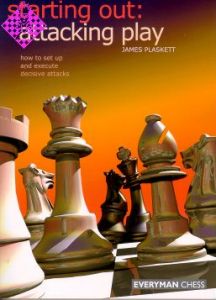 Attacking Play16,95 €
Attacking Play16,95 € -
 Benoni Systems and Structures24,95 €
Benoni Systems and Structures24,95 € -
 Attacking with 1d4 & 1e423,50 €
Attacking with 1d4 & 1e423,50 € -
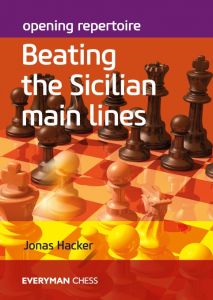 Beating the Sicilian Main Lines24,95 €
Beating the Sicilian Main Lines24,95 € -
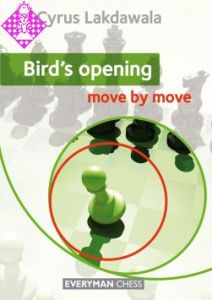 Bird´s Opening - Move by Move24,50 €
Bird´s Opening - Move by Move24,50 € -
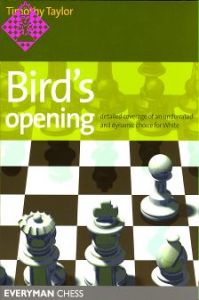 Bird's Opening18,50 €
Bird's Opening18,50 € -
 Benoni und Benkö21,80 €
Benoni und Benkö21,80 € - Mehr von Everyman

